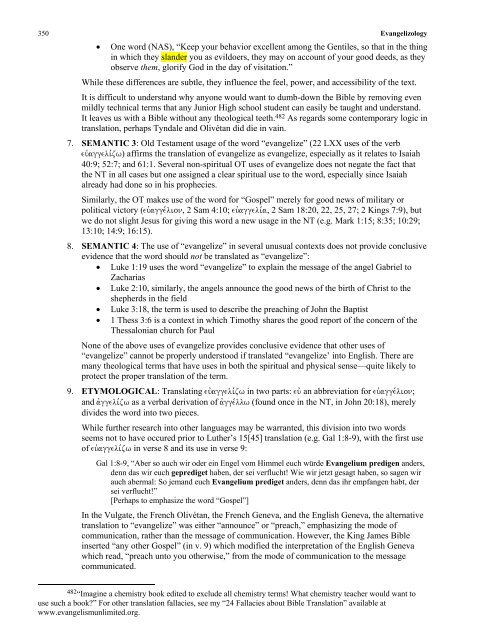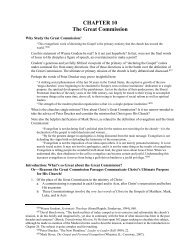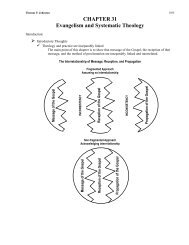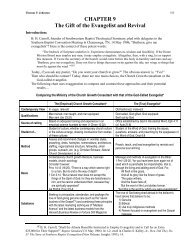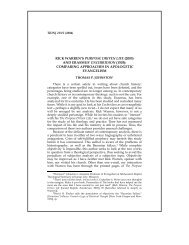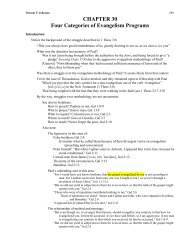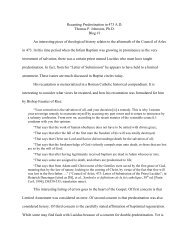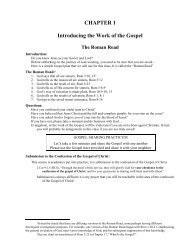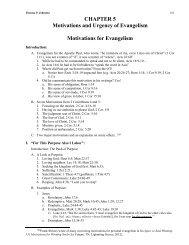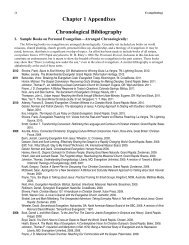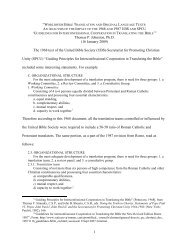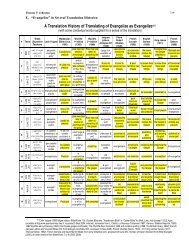CHAPTER 7 Defining Evangelizing - Evangelism Unlimited
CHAPTER 7 Defining Evangelizing - Evangelism Unlimited
CHAPTER 7 Defining Evangelizing - Evangelism Unlimited
You also want an ePaper? Increase the reach of your titles
YUMPU automatically turns print PDFs into web optimized ePapers that Google loves.
350 Evangelizology<br />
One word (NAS), “Keep your behavior excellent among the Gentiles, so that in the thing<br />
in which they slander you as evildoers, they may on account of your good deeds, as they<br />
observe them, glorify God in the day of visitation.”<br />
While these differences are subtle, they influence the feel, power, and accessibility of the text.<br />
It is difficult to understand why anyone would want to dumb-down the Bible by removing even<br />
mildly technical terms that any Junior High school student can easily be taught and understand.<br />
It leaves us with a Bible without any theological teeth. 482 As regards some contemporary logic in<br />
translation, perhaps Tyndale and Olivétan did die in vain.<br />
7. SEMANTIC 3: Old Testament usage of the word “evangelize” (22 LXX uses of the verb<br />
euvaggeli,zw) affirms the translation of evangelize as evangelize, especially as it relates to Isaiah<br />
40:9; 52:7; and 61:1. Several non-spiritual OT uses of evangelize does not negate the fact that<br />
the NT in all cases but one assigned a clear spiritual use to the word, especially since Isaiah<br />
already had done so in his prophecies.<br />
Similarly, the OT makes use of the word for “Gospel” merely for good news of military or<br />
political victory (euvagge,lion, 2 Sam 4:10; euvaggeli,a, 2 Sam 18:20, 22, 25, 27; 2 Kings 7:9), but<br />
we do not slight Jesus for giving this word a new usage in the NT (e.g. Mark 1:15; 8:35; 10:29;<br />
13:10; 14:9; 16:15).<br />
8. SEMANTIC 4: The use of “evangelize” in several unusual contexts does not provide conclusive<br />
evidence that the word should not be translated as “evangelize”:<br />
Luke 1:19 uses the word “evangelize” to explain the message of the angel Gabriel to<br />
Zacharias<br />
Luke 2:10, similarly, the angels announce the good news of the birth of Christ to the<br />
shepherds in the field<br />
Luke 3:18, the term is used to describe the preaching of John the Baptist<br />
1 Thess 3:6 is a context in which Timothy shares the good report of the concern of the<br />
Thessalonian church for Paul<br />
None of the above uses of evangelize provides conclusive evidence that other uses of<br />
“evangelize” cannot be properly understood if translated “evangelize’ into English. There are<br />
many theological terms that have uses in both the spiritual and physical sense—quite likely to<br />
protect the proper translation of the term.<br />
9. ETYMOLOGICAL: Translating euvaggeli,zw in two parts: euv an abbreviation for euvagge,lion;<br />
and avggeli,zw as a verbal derivation of avgge,llw (found once in the NT, in John 20:18), merely<br />
divides the word into two pieces.<br />
While further research into other languages may be warranted, this division into two words<br />
seems not to have occured prior to Luther’s 15[45] translation (e.g. Gal 1:8-9), with the first use<br />
of euvaggeli,zw in verse 8 and its use in verse 9:<br />
Gal 1:8-9, “Aber so auch wir oder ein Engel vom Himmel euch würde Evangelium predigen anders,<br />
denn das wir euch geprediget haben, der sei verflucht! Wie wir jetzt gesagt haben, so sagen wir<br />
auch abermal: So jemand euch Evangelium prediget anders, denn das ihr empfangen habt, der<br />
sei verflucht!”<br />
[Perhaps to emphasize the word “Gospel”]<br />
In the Vulgate, the French Olivétan, the French Geneva, and the English Geneva, the alternative<br />
translation to “evangelize” was either “announce” or “preach,” emphasizing the mode of<br />
communication, rather than the message of communication. However, the King James Bible<br />
inserted “any other Gospel” (in v. 9) which modified the interpretation of the English Geneva<br />
which read, “preach unto you otherwise,” from the mode of communication to the message<br />
communicated.<br />
482 “Imagine a chemistry book edited to exclude all chemistry terms! What chemistry teacher would want to<br />
use such a book?” For other translation fallacies, see my “24 Fallacies about Bible Translation” available at<br />
www.evangelismunlimited.org.


